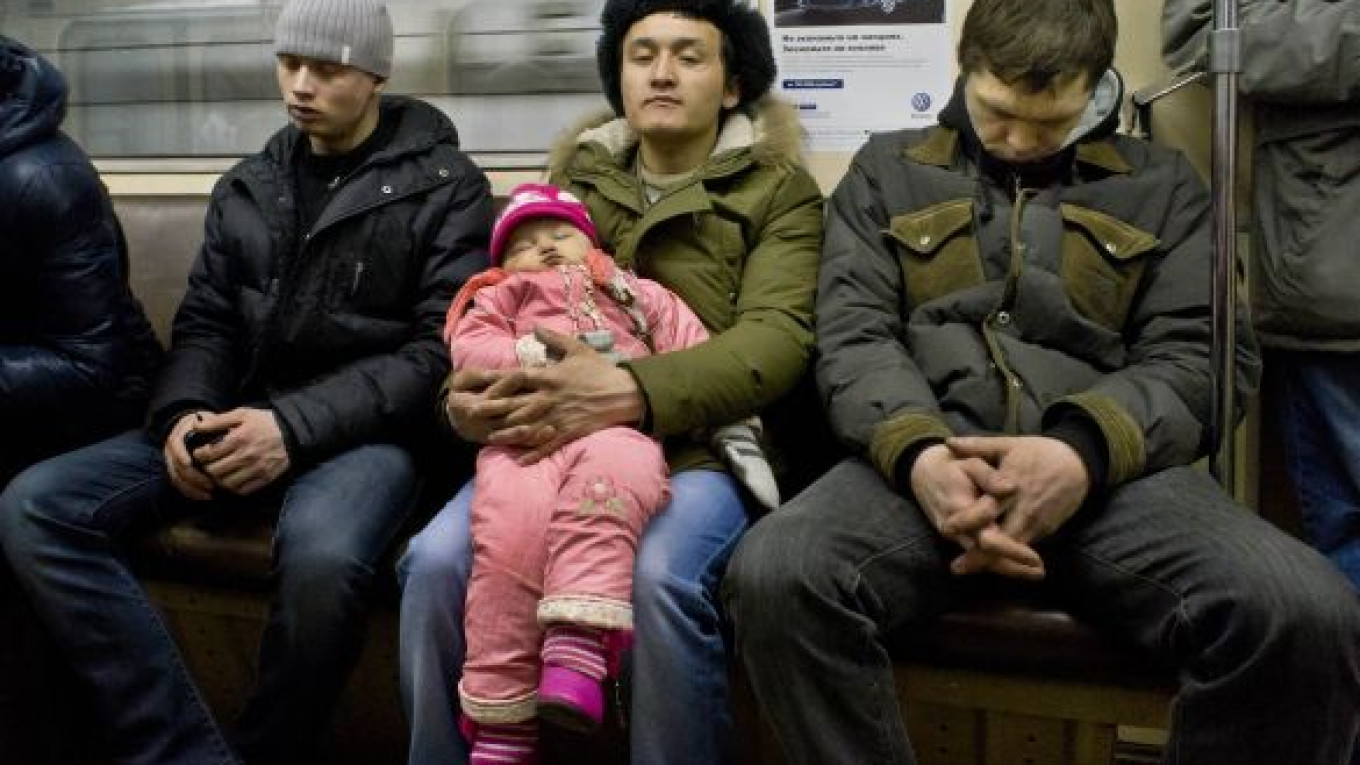BISHKEK, Kyrgyzstan — Kyrgyz high school students can sign up for lessons on moving to Russia, including crash courses on Russian legislation on migration, how to apply for work permits, and how to find jobs in Russia.
The optional classes — taught as part of the high school curriculum in the Central Asian country's Issyk Kul province — were designed after research by nongovernment organizations indicated that half the senior students in schools in Karakol, the region's administrative capital, planned to migrate to Russia upon graduating.
But one thing that might catch students by surprise are the sometimes dismal living conditions waiting for them in Russia — a thorny issue that has entered the spotlight as Kyrgyzstan prepares to join the Customs Union of Russia, Belarus and Kazakhstan in early 2015. Many in Kyrgyzstan fear the accession talks are not adequately addressing issues of labor migration.
"The problem of labor migration is still open," said Aigul Ryskulova, head of a working group established by the Kyrgyz president to develop proposals for a national migration policy.
While accession to the Customs Union will resolve certain economic issues, even making it easier for Kyrgyz migrants to work in Russia legally, Ryskulova said that not enough was being been done toward improving their living conditions.
Gulshaiyr Abdirasulova, a representative of the human rights group Open Viewpoint, said migrant workers' rights are often violated in Russia, with migrants living in dreadful conditions and having little access to health care.
In recent weeks, the issue of migration has become especially pertinent. Increasing ethnic tensions between Russian citizens and foreign migrants resulted in major clashes at two Moscow street markets in July and October. The incidents were followed by mass police checks on migrants.
Migration to Russia is seen as the route to success for many in impoverished Kyrgyzstan. Realizing this, the local education board in the in the northern Issyk Kul province, which borders Kazakhstan and China, asked a public organization called Shoola-Kol to provide the classes on how to legally work in Russia.
Still, a significant majority of migrant workers are employed illegally in Russia. According to official Russian data, 133,500 Kyrgyz citizens obtained nine-month work permits this year. But the Kyrgyz Labor, Migration and Youth Ministry estimates that in the last 10 months as many as 350,000 to 500,000 Kyrgyz citizens have worked in Russia.
Many migrant workers cite the difficult procedures entailed in obtaining a work permit as the main reason for working illegally, and it is unclear whether this situation will improve following Kyrgyzstan's accession to the Customs Union.
"Often when the authorities stop you, they say your papers are out of order or fake, even when you have all the right documents," said Ikrom Abudusharev, a Kyrgyz citizen who recently returned to his home city of Osh after working in a Russian computer shop in Kaliningrad for seven months.
Discussions on accession have touched upon migration. At a joint session between the State Duma and the Kyrgyz parliament held in Bishkek on Nov. 15, a lawmaker underscored Russian concerns that migrants needed to be able to speak the Russian language.
"Russia would like to see prepared, educated Kyrgyz labor migrants who speak the Russian language," said Leonid Slutsky, a deputy with the Liberal Democratic Party.
No one doubts that accession to the Russian-led trade bloc will give Kyrgyzstan a much-needed economic boost. Researchers studying the economic benefits say accession to the single labor market could increase migration by as much as 10 to 15 percent, and this, in turn, could lead to significant increases in migrant salaries and cash remittances.
So the outstanding question is whether Kyrgyzstan will seek — and secure — greater benefits during negotiations. This puts Russia, which has strongly pushed former Soviet republics to join the Customs Union, a potential rival to the European Union, in a difficult position as it struggles to balance its regional trade ambitions against rising anti-immigration sentiments among its citizens.
"Kyrgyzstan's accession to the Customs Union … will require parliamentary diplomacy and the resolution of other topics that are important for both countries," Slutsky told the joint parliamentary session.
A road map for Kyrgyzstan's accession to the Customs Union will be finalized within two months, Kremlin adviser Sergei Glazyev told reporters in Yerevan last week. A similar road map for Armenia's membership will also be completed by that time, he said.
Contact the author at [email protected]
A Message from The Moscow Times:
Dear readers,
We are facing unprecedented challenges. Russia's Prosecutor General's Office has designated The Moscow Times as an "undesirable" organization, criminalizing our work and putting our staff at risk of prosecution. This follows our earlier unjust labeling as a "foreign agent."
These actions are direct attempts to silence independent journalism in Russia. The authorities claim our work "discredits the decisions of the Russian leadership." We see things differently: we strive to provide accurate, unbiased reporting on Russia.
We, the journalists of The Moscow Times, refuse to be silenced. But to continue our work, we need your help.
Your support, no matter how small, makes a world of difference. If you can, please support us monthly starting from just $2. It's quick to set up, and every contribution makes a significant impact.
By supporting The Moscow Times, you're defending open, independent journalism in the face of repression. Thank you for standing with us.
Remind me later.






